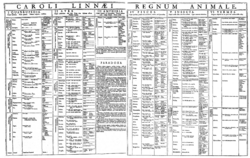Zoology
Zoology (from Greek ζῷον, zoon, "animal" + λόγος, "logos", "knowledge") is the branch of biology concerned with the study of animals.
Contents |
Name
The pronunciation of "zoology" is /zoʊˈɑləʤɪ/; however, an alternative pronunciation is /zuˈɑləʤɪ/.[1] The word zoology originates from the Greek zōon, meaning animal, and logos, meaning study.
Systems of classification

Morphography includes the systematic exploration and tabulation of the facts involved in the recognition of all the recent and extinct kinds of animals and their distribution in space and time. (1) The museum-makers of old days and their modern representatives the curators and describers of zoological collections, (2) early explorers and modern naturalist travelers and writers comprise zoo-geography, and (3) collectors of fossils and palaeontologists are the chief varieties of zoological workers coming under this heading. Gradually, since the time of Hunter and Cuvier, anatomical study has associated itself with the more superficial morphography until today no one considers a study of animal form of any value which does not include internal structure, histology and embryology in its scope.
Subfields of zoology
The study of animal life is, of course, ancient: but as 'zoology' it is relatively modern, for what we call biology was known as 'natural history' at the start of the nineteenth century. During the lifetime of Charles Darwin, natural history turned from a gentlemanly pursuit to a modern scientific activity. Zoology as we know it was first established in German and British universities. The institution of zoology training in British universities was mainly established by Thomas Henry Huxley. His ideas were centered on the morphology of animals: he himself is considered by many to have been the greatest comparative anatomist of the second half of the nineteenth century. His courses were composed of lectures and laboratory practical classes; and his system became widely spread.
There was much left out by Huxley, especially the study of animals in their environment, which had been the main stimulus for both Darwin and Alfred Russel Wallace (who both came up with the idea of natural selection). The fact that neither Darwin nor Wallace ever held a university teaching post may have contributed to this rather startling omission. Gradually Huxley's comparative anatomy was supplemented by other much-needed methods. The field of zoology in the twentieth century mainly comprised these approaches:
- Comparative anatomy studies the structure of animals.
- The physiology of animals is studied under various fields including anatomy and embryology
- The common genetic and developmental mechanisms of animals and plants is studied in molecular biology, molecular genetics and developmental biology
- Ethology is the study of animal behavior.
- The ecology of animals is covered under behavioral ecology and other fields
- Evolutionary biology of both animals and plants is considered in the articles on evolution, population genetics, heredity, variation, Mendelism, reproduction.
- Systematics, cladistics, phylogenetics, phylogeography, biogeography and taxonomy classify and group species via common descent and regional associations.
- The various taxonomically-oriented disciplines such as mammalogy, herpetology, ornithology identify and classify species, and study the structures and mechanisms specific to those groups. Entomology is the study of insects, by far the largest group of animals.
- Palaeontology, including all that may be learnt of ancient environments.
Notable zoologists
In alphabetical order by surname:
- Louis Agassiz (malacology, ichthyology)
- Aristotle
- David Attenborough
- Henry Walter Bates (Batesian mimicry, Amazon)
- Pierre Joseph Bonnaterre
- Rachel Carson (marine biologist)
- Archie Carr (Herpetology, esp. sea turtles)
- Archie Carr III, (wild mammals)
- Eugenie Clark (Ichthyology)
- Jeff Corwin (herpetology)
- Georges Cuvier (founder of comparative morphology)
- Charles Darwin (theory of evolution, natural selection, sexual selection)
- Richard Dawkins (ethology, evolutionary biology)
- James R. Dixon (Herpetology)
- William Flower (mammals)
- Edmund Brisco Ford (ecological genetics)
- Dian Fossey (primatology)
- Birutė Galdikas (primatology)
- Jane Goodall (primatology)
- Ernst Haeckel (marine biologist), (naturalist)
- Victor Hensen (planktology)
- Bernard Heuvelmans (cryptozoology)
- Julian Huxley (evolutionary synthesis, humanism, World Wildlife Fund, UNESCO)
- Thomas Henry Huxley (evolution, agnosticism, science educationcxzbiches btche
- Al-Jahiz
- William Kirby (father of entomology)
- Hans-Wilhelm Koepcke (ornithology, herpetology)
- E. Ray Lankester (zoology and comparative anatomy)
- Carolus Linnaeus (father of systematics; primarily a botanist)
- Konrad Lorenz (ethology)
- David W. Macdonald (wild mammals)
- John Maynard Smith (evolutionary biology, genetics)
- Ernst Mayr (evolutionary biology)
- Fritz Müller (evolutionary biology, Müllerian mimicry, Brazil)
- Desmond Morris (ethology)
- Richard Owen (vertebrate palaeontology, dinosaurs, Natural History Museum)
- Roger Tory Peterson (ornithology)
- Eric Pianka (herpetologist)
- William Emerson Ritter (marine biology)
- Thomas Say (entomology)
- Shen Kuo (medieval Chinese zoologist)
- Su Song (medieval Chinese zoologist)
- Dave Salmoni
- ll (animal behavior, invertebrate zoology)
- Ernst Freiherr von Blomberg (anthrozoology and religion)
- Alfred Russel Wallace (natural selection, zoogeography, animal colouration, Amazon, East Indies)
- E.O. Wilson (entomology, especially ants, founder of sociobiology)
- Robert Broom
- Austin Stevens (herpetology, especially snakes
- Saravana and other serpents.
See also
- Zoological distribution
- Zootomy - the study of animal anatomy or animal dissection
- Cryptozoology - the study of animals who currently fall outside the parameters of zoology
- Paleontology - the study life in the past
- Oceanography - the study of the oceans
- Entomology - the area of biology that studies insects
- Malacology and conchology, the study of mollusks, and their shells
- Botany - the area of biology that studies plants
- Microtomy
- List of zoologists
- Important Publications in Zoology
- Anthrozoology
- Animals in Buddhism
- Islam and animals
- Timeline of zoology
- History of zoology (through 1859)
Sources and external links
- A Study Guide to Invertebrate Zoology ~ at Wikibooks
- Online Dictionary of Invertebrate Zoology
- An online dissection pictures of animals
- Dictionary.com's discussion of pronunciation
References
- This article incorporates text from the Encyclopædia Britannica Eleventh Edition, a publication now in the public domain.
|
|||||